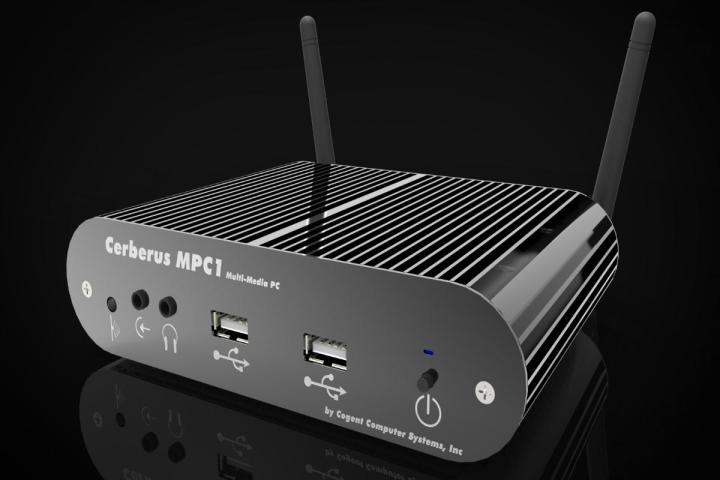
Update 3/10/14 1:28 PM ET: The price on the base model Cerberus has been dropped from $599 to $449.
The PC market seems to be experiencing some considerable shrinkage – not just in the amount of units shipped annually, but in the size of PCs in general. Companies are increasingly moving to slim down and stuff as much hardware as possible into small form factor cases. Even high-end PC manufacturers like Digital Storm and Alienware have gotten into the game, a significant shift considering that these $2,000+ PCs have traditionally shipped with huge cases with loads of room for upgrades.
To use a cliché, small is the new big when it comes to PCs. And we can add Cerberus to the list of PC makers that are going the small form factor route with their MPC1 mini PC.
The Cerberus MPC1 looks like a high-class Wi-Fi router (it is made out of aeronautics-grade aluminum, after all), but don’t let its looks fool you: it aims to serve as an all-purpose rig, whether you want to hook it up to your TV, or use it for productivity or Web-surfing purposes.
The Cerberus MPC1 will be equipped with an AMD 2GHz quad core processor, 4GB of RAM, 500GB hard drive, 802.11ac Wi-Fi, and Bluetooth 4.0. Port selection includes two USB 3.0, two USB 2.0, two HDMI, Ethernet, and audio jacks. The Cerberus MPC1 will support Windows 7, Windows 8, Chrome OS and Linux as well. With dimensions of 6 x 4.33 x 1.5 inches, you’ll be able to stuff the Cerberus just about anywhere. It’s also fanless, and Cerberus claims that their rig only consumes 25 watts of power at maximum. You can also upgrade the Cerberus via a 2.5-inch hard drive slot, or an mSATA socket.
Cerberus is currently holding an Indiegogo crowdfunding campaign, which just started yesterday, to fund and market the MPC1. The base model Cerberus costs $599, but if you put down $999, you can get it two months ahead of the August 2014 delivery time-frame and serve as a beta tester for Cerberus. Smartly, Cerberus also allows customers to outfit the MPC1 with upgrades when you order. For instances, $49 can double your RAM from 4GB to 8GB, or your hard drive space from 500GB to 1TB.
It will be interesting to see how the Cerberus MPC1 will stack up against other small form factor PCs that are on the horizon, like the Tango.
What do you think? Sound off in the comments below.

